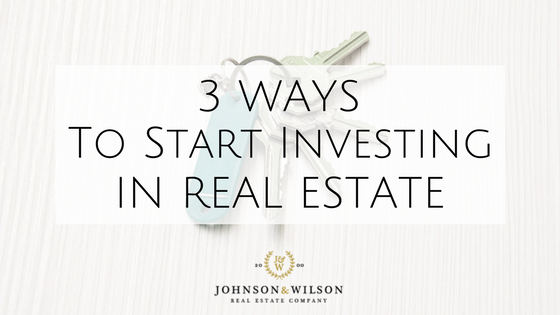Ever wonder where all those big-time real estate investors started? Sure, some of them might've started with a trust fund or inherited properties, but for the most part, successful real estate investors work their way up one house at a time. Are you interested in becoming a real estate investor but not quite sure where to start? Let’s talk about three common ways to get started in real estate investing. You might find it’s easier than you think!
Become a Landlord
The quickest and easiest way to get started in real estate investing is to rent out a home you already own. Some people sort of stumble into this by becoming an “accidental landlord,” forced to rent out their home when they can’t sell it. To those people, owning a rental property wasn’t necessarily something they were interested in, but in a lot of cases it leads to bigger and better things. Owning an investment like a house isn’t just about appreciation of a home and how much money you can make in a sale. It’s about making that house work for you.
Let’s say you stand to make $50,000 on the sale of your home. That’s a large sum of money for most people, and it would certainly be nice to have. But take that profit amount and deduct closing costs, commissions, and taxes, and it decreases by a good bit. On the other hand, if you chose to rent that same home for $2,000 a month, it would take 25 months to make that same amount. That’s only a little over two years of doing next to nothing to earn a monthly paycheck. Of course there will be landlordly duties here and there, or the small percentage you’ll pay to a property management company if you choose to go that route. But by the time you make up that $50,000 you might have made on the same of your home, you might even own a second rental property that makes you even more.
The bottom line: Would you rather make a lump sum up front and watch it be slowly (or maybe quickly!) spent? Or would you rather make your house work for you and see money come in every month that could cover the living expenses for your new home?
Do a Live-In Flip
This takes time, hard work, and patience, but it can really pay off in the end. Ideally, this is a project that should be done by a single person, a couple without children, or a family with older children. Your home will essentially become a 24/7 construction zone, and having little ones running around won’t be safe. It also takes a little bit of capital to begin with, because not only will you be paying the mortgage on the house, but you’ll also be spending money to fix it up.
If you’re going to flip a home, you need to do it the right way. Don’t try to cut corners to save money. Buyers are way more educated on flip homes and fixer-uppers than they were ten or so years ago, so taking shortcuts will only hurt you when you put the house on the market. Don’t just give the home a cosmetic upgrade. Make sure to address things like electrical wiring, the HVAC system, safety features, and structural issues. When you do get around to the cosmetic upgrades, don’t skimp. Make sure fixtures match and flooring won’t look cheap or show wear too quickly. And don’t forget about curb appeal!
The bottom line: If you have the time and money to flip a home, go for it. Just go into it knowing that it’s going to be more work than you think, and you’ll need extra room in the budget just in case.
Find a Mentor and Partner Up
The easiest way to learn is by doing. That doesn’t mean you should jump right in feetfirst, though. Do your homework first by researching the current market and what it takes to invest. Have coffee or lunch with a few successful investors and ask their advice. If you find that you trust and get along well with one in particular, ask if they’d be willing to be your mentor. Maybe even propose a partnership for your first investment experience.
Whether the partnership is an equal buy-in for a flip house or partial interest in a multi-family home or complex, having an interested party there to show you the way makes for priceless experience. It also keeps you from making ill-informed decisions or impulsive moves that might not be the best choice for your situation. In addition, partnering up with a mentor means you won’t have to put forth as much money up front as you’d have to if you did it all alone.
The bottom line: Partnering with someone you trust means you’ll need less capital to start with. You’ll also learn valuable lessons along the way by actually doing instead of just reading about how to invest in real estate.
There’s no one end-all, be-all solution in the real estate world. There’s a myriad of other ways to invest in real estate, but these are three of the most common, get-your-hands-dirty ways to get started. Have questions about where to begin? Don’t hesitate to give us a call today. We’d be happy to help you figure out the best route for you in your real estate investing adventure.






